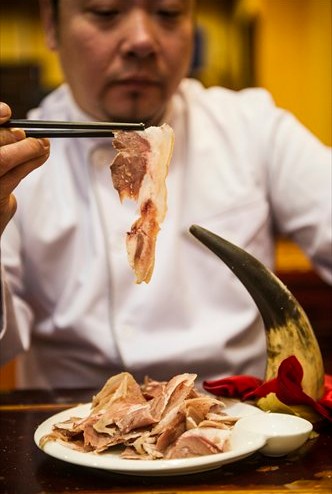 |
| Lamb's head meat is an old Beijing favorite. Photo: Li Hao/GT |
Wang Hongjie leans over and grabs a piece of lamb face from the fridge. He turns it face down on the cutting board. With his right hand, he takes a squarish cleaver. Slowly and carefully, he carves it into thin slices.
As winter approaches, the classic Beijing dish baishui yangtou, or "boiled lamb head," has become more popular, as are other foods made with animal heads. In Chinese cuisine, there's a culture of eating offcuts as a delicacy, especially when the weather turns cold.
The correct way to eat lamb head is to boil it in water, and then, after it has cooled, to slice the meat thinly and sprinkle it with salt, pepper and other spices, said Wang, the CEO of Liji Lamb Head restaurant, a time-honored brand.
The local history of eating lamb head, Wang said, dates back to the Ming Dynasty (1368-1644) and the people who raised sheep for a living in what is now Daxing district. They were poor and didn't want to throw away any part of the animal that was edible.
"It became even more popular in the Qing Dynasty (1644-1911)," Wang said. "It tastes special. For wealthy people, they are used to meat, so this type of meat is different. For the common people, it's cheap and delicious, so of course it was well-received."
In the same way, duck heads are popular in Beijing. This snack, which originated in Wuhan, Hubei Province, can be seen everywhere from streetside snack stands to high-end restaurants.
Lü Yan, a Wuhan native who works in Beijing as a data analyst, said she craves duck heads and necks from time to time.
"There's a 'commoner' mentality in the character of people in Wuhan. They walk around topless in the summer and don't pick the most high-end foods. They care about the taste," Lü said. "Heads and necks might not have much meat on them, but they are spicy and there's nothing better than gnawing on them while drinking some beer."
Chain stores specializing in the snack, such as Zhouheiya or Jiujiuya, have become popular all over the country. The duck heads and necks are usually marinated and cooked to different degrees of spiciness, thus winning a pool of loyal supporters.
People can't care about their appearance when eating such foods, Lü said. Eating heads is messy and it can be difficult to get all the meat, but that also provides the fun.
Another famous dish is rabbit head, which originated in Chengdu, Sichuan Province. Beijingers can taste the delicacy in restaurants such as Shuangliu Rabbit Head, Chaoyang district.
Jiang Hao, 26, who works in the advertising business in Beijing, said he picked up the habit of eating rabbit heads while studying in college in Chengdu. He enjoyed the spiciness as well as the admiration of others that he could eat something so "exotic."
The popularity of such cuisine once had something to do with price and the difficulty of getting edible pieces of meat. Nowadays, however, eating leftover parts such as heads can be fashionable for people who are tired of regular cuisine. Besides, classic cuisines are always developing to suit the needs and appetites of the current consumers, Wang said.
"It's too bad expats don't understand why we enjoy this type of cuisine. If they looked at lamb heads, they probably would lose their appetite," Wang said. "But after we slice the lamb meat and serve it at the table, it should be more acceptable to the general public."
We recommend:
